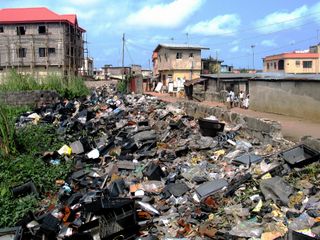UN to tackle global e-waste
Teaming up with electronics companies to produce guidelines

The United Nations ( UN ) has teamed up with technology giants including Microsoft , HP and Philips to work out global guidelines on e-waste.
Three UN agencies, 16 companies, and several government bodies and universities are to work together to protect the environment from e-waste mountains of disposed computers, phones and TVs. The group is to set targets on recycling and longer lives for electronic goods.
"There's an urgent need to harmonise approaches to electronic waste around the world," said Ruediger Kuehr of the UN University, who will head up the new STEP (Solving the E-waste Problem) project in Bonn, Germany.
Electronic and electrical waste is among the fastest-growing types of rubbish in the world and soon it is likely to reach 40 million tons a year, according to STEP.
New guidelines
STEP is aiming to introduce guidelines for disposing of gadgets, building on national legislation from places like Japan, the US and the European Union.
The alliance said it looks to encourage companies to make longer-lasting products, and encourage development of more products with upgradeable components. It hopes to develop a STEP logo that companies can put on their products to show that they conform to international waste guidelines.
"Consumers will benefit through knowing what to do with their obsolete machines, less pollution and longer-lasting electronic equipment," Hans van Ginkel, the head of the UN University , said in a statement .
Get daily insight, inspiration and deals in your inbox
Get the hottest deals available in your inbox plus news, reviews, opinion, analysis and more from the TechRadar team.
"Companies involved in STEP will benefit through globally standardised, safe and environmentally-proven processes for disposal, reduction or reuse, and recycling of e-scrap," he said.
STEP said that the new guidelines would not increase prices of gadgets, and that costs could even drop with streamlined global rules.
E-waste - including microwave ovens, batteries, photocopiers and hairdryers - often releases toxins if it's incinerated, Kuehr told Reuters . Older gadgets often contain poisonous chemicals such as dioxins or PCBs, or heavy metals such as mercury or cadmium, which are hazardous if dumped on landfill sites.
Since 2005, the Waste Electrical and Electronic Equipment (WEEE) Directive requires electronics companies to set up recycling and disposal schemes for their products.
